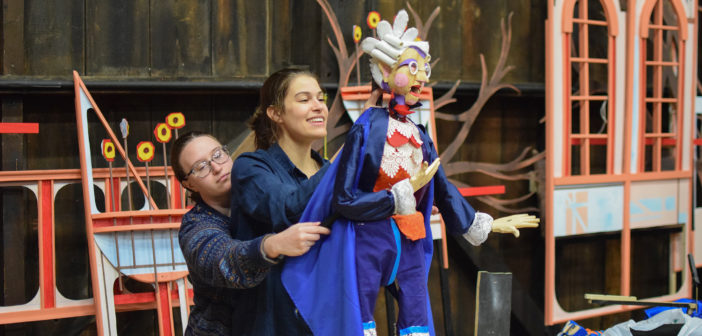When thinking of a play set in 17th century Germany, one usually doesn’t expect the actors to be puppets.
The Mock Turtle Marionette Theater is working in conjunction with the Bach Choir and the Bach Festival Orchestra to bring life to Hans Christian Andersen’s “The Nightingale” in Baker Hall on Sunday at 3 p.m.
“The Nightingale” is about an emperor who learns that the most beautiful thing in his empire is the song of the nightingale. He orders that the nightingale be caught and brought to his court so he can hear its music but is then given a bejeweled, mechanical bird that steals his interest. When the emperor falls deathly ill, only the real nightingale’s song can save him.
In this adaptation of the play, the characters are acted out by puppets that Mock Turtle founder Doug Roysdon built specifically for each role. The puppets require two people to operate — one working the mouth and the other moving the arms.
Roysdon said he thinks he might have invented a new type of puppet, calling them Bunrodku. Roysdon’s puppets are a combination of Japanese puppet style called Bunraku, which requires three people to operate, and a rod puppet, which is a one-person puppet controlled by a rod.
To bring his ideas to life, Roysdon sits down and sketches every puppet before he builds them. He said he can make a puppet in a two-week period when working on and off, but it takes a long time to make the puppets just right. Roysdon said he finds himself tinkering with the puppets constantly the more he works with them.
Traditionally, “The Nightingale” is set in China. However, when the Mock Turtle started working with the Bach Choir, Roysdon rewrote the entire script to take place in Germany. Roysdon said his script follows the basic structure Andersen wrote in his play, but for the most part it is much different from the original.
Roysdon said he wrote his first versions of his script in the 1980s, following the original version closely. He said that even with his target audience of 8- to 9-year-old children, the first versions of the script were too tame.
“The script evolved in responding to my audience,” Roysdon said. “What does my audience want? What does my audience need?”
Roysdon said he added plot shifts and characters into the play that aren’t in the original, including an increased role for the character Death, changing the main villain of the story and the addition of ghosts. He said the nice thing about the play is that it’s about comparing natural sounds to a kind of artificial music. The Bach Choir is singing all the music live for play, lending to the theme.
While he wrote the script for the play, Roysdon developed an understanding of what the puppets should look like when he started to sketch them. Switching the setting of the play from China to Germany allowed for Roysdon to work with new costumes, jackets and wigs for the puppets.
After they are built, Roysdon said the puppets “tell him” how they speak and what their mannerisms are. Roysdon said a puppet becomes a character when the controller works with the puppet and builds a relationship with it. Roysdon said even though the puppets are made the same way, they all move in different ways.
“The puppet tells you through its mechanical motions how it ought to be addressed,” Roysdon said.
Roysdon said there are a lot of vectors that go into defining a puppet and its personality, including the puppeteers input and the script. He said making a puppet and demanding it be and act a certain way is “just stupid.” He said the puppet grows from the different vectors and becomes what it becomes.
“The puppet tells you through its mechanical motions how it ought to be addressed,” Roysdon said. “Actually, the more you delve into (“The Nightingale”), it’s about music as a force of life.”
The play’s first performance will be in Baker Hall at the Zoellner Arts Center. General admission tickets are $17.






Comment policy
Comments posted to The Brown and White website are reviewed by a moderator before being approved. Incendiary speech or harassing language, including comments targeted at individuals, may be deemed unacceptable and not published. Spam and other soliciting will also be declined.
The Brown and White also reserves the right to not publish entirely anonymous comments.
1 Comment
Pingback: Puppetmaster Doug Royston ready for his Zoellner debut with new production – The Brown and White | ACoverage